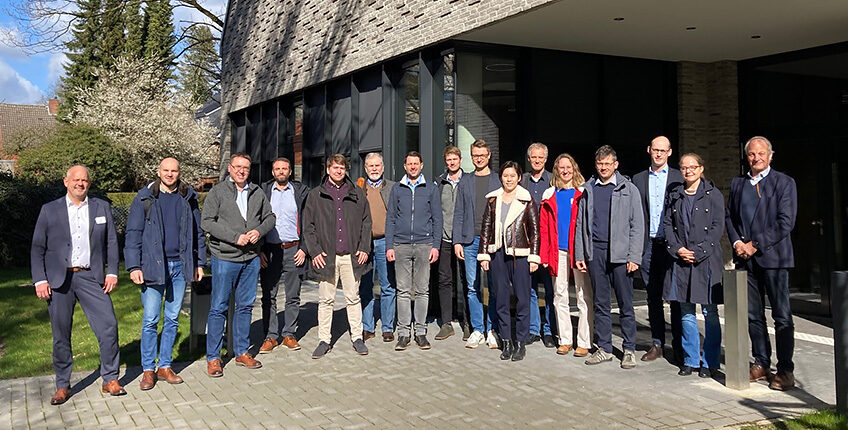Wind as the main propulsion for cargo shipping – before fossil energy fuels became standard, what was common 100 years ago could become relevant again for the future.
With the design of a new kind of cargo sailing ship, the consortium of the BMDV-funded project ‘Cargo sailing ship with alternative drives’, or ‘rasant’ for short, is creating a shipping concept that meets the requirements of modern freight shipping while using wind as the main source of propulsion. A climate-neutral drive concept based on hydrogen-based renewable fuels (e-fuels) is provided as an auxiliary drive. The project was launched today with a kick-off event in Leer.
Challenge: Use of wind as a main propulsion source
Previous wind concepts have considered wind propulsion systems to be auxiliary drives. They are also referred to as wind-assisted propulsion systems (WAPS). The challenge of the current project is to use wind as the main source of propulsion for a cargo ship. This requires a complete rethinking in shipping design with a sailing system that takes into account the marketability of such an environmentally- and climate-friendly ship. “A modern cargo sailing ship is feasible in principle, but it needs the right combination of design, technology and drive concept to result in a functioning ship.”, said project leader, Prof. Captain Michael Vahs from the Emden/Leer University of Applied Sciences. The project will look for the optimal sailing system for the task at hand in a technology-neutral way, which can then be integrated into the ship’s design.
Dr. Volker Wissing, Federal Minister for Digital and Transport said: “We support innovative technologies and concepts on the path to climate-neutral shipping. Using a technology-neutral approach, proven main sources of propulsion such as wind are increasingly becoming the focus of shipping. By funding this study on an innovative cargo sailing ship, we are laying the groundwork for a completely new shipping concept that intelligently combines the use of wind and e-fuels on board. With the participation of numerous study partners, we are supporting German companies in their activities in the field of innovative and climate-neutral shipping.”
Energy generation on board through hydrogen-based fuels
The auxiliary drive is powered by hydrogen-based renewable fuels. Synthetic fuels such as methanol or SNG (synthetic natural gas) are options here. A system comparison of the various energy generation options through fuel cells or combustion engines will be included in the assessment. The aim of the project is a marketable concept, so that technologies and bunkering options available on the market are taken into account, particularly in the selection of the fuel and energy concept. In choosing the drive concept, the requirements of shipyards will also be taken into consideration, which ultimately have to facilitate the operation of a cargo sailing ship. An important focus of the project therefore, is to have low-maintenance controllable systems on board, so that cargo sailing is successful.
Broad alliance of research institutions and companies from the maritime sector
The project will be carried out by research institutions, however the work will be conducted in very close cooperation with engineering firms, shipping companies and suppliers. This cooperation is very significant for the project, because a broad spectrum of knowledge from a wide variety of disciplines and industries is required to design a cargo sailing ship that is attractive for the market.
Background:
The cargo sailing ship project with alternative drives, ‘rasant’, is funded under the National Innovation Programme for Hydrogen and Fuel Cell Technology in the amount of around 2.9 million euros by the Federal Ministry for Digital and Transport. The funding guideline is coordinated by NOW GmbH and implemented by Project Management Jülich (PtJ).
The project began on 1 January 2023 and has a project duration of two and a half years. The project consortium comprises the following partners, headed up by Emden/Leer University of Applied Sciences:
- Fraunhofer Institute for Wind Energy Systems IWES (Bremerhaven)
- Emden/Leer University of Applied Sciences (Leer)
- Flensburg University of Applied Sciences, Maritime Center (Flensburg)
- MARIKO GmbH (Leer)
Associated project partners are:
- Buerau Veritas SA (Hamburg)
- Eco Flettner GmbH (Leer)
- Freudenberg Fuel Cell e-Power Systems GmbH (Munich)
- ENERCON Logistic GmbH (Aurich)
- Hartmann Shipping Services Germany GmbH & Co. KG (Leer)
- HB Hunte Engineering GmbH (Oldenburg)
- Judel/vrolijk & co design + engineering GmbH (Bremerhaven)
- Nautitec GmbH & Co. KG (Leer)
- Ostseestaal GmbH & Co. KG (Stralsund)
- Peters Werft GmbH (Wewelsfleth)
- Rörd Braren Bereederungs- GmbH & Co. KG (Kollmar)
- German Shipowners’ Association (Hamburg)
Further information on the project can be found on the website of Mariko GmbH


